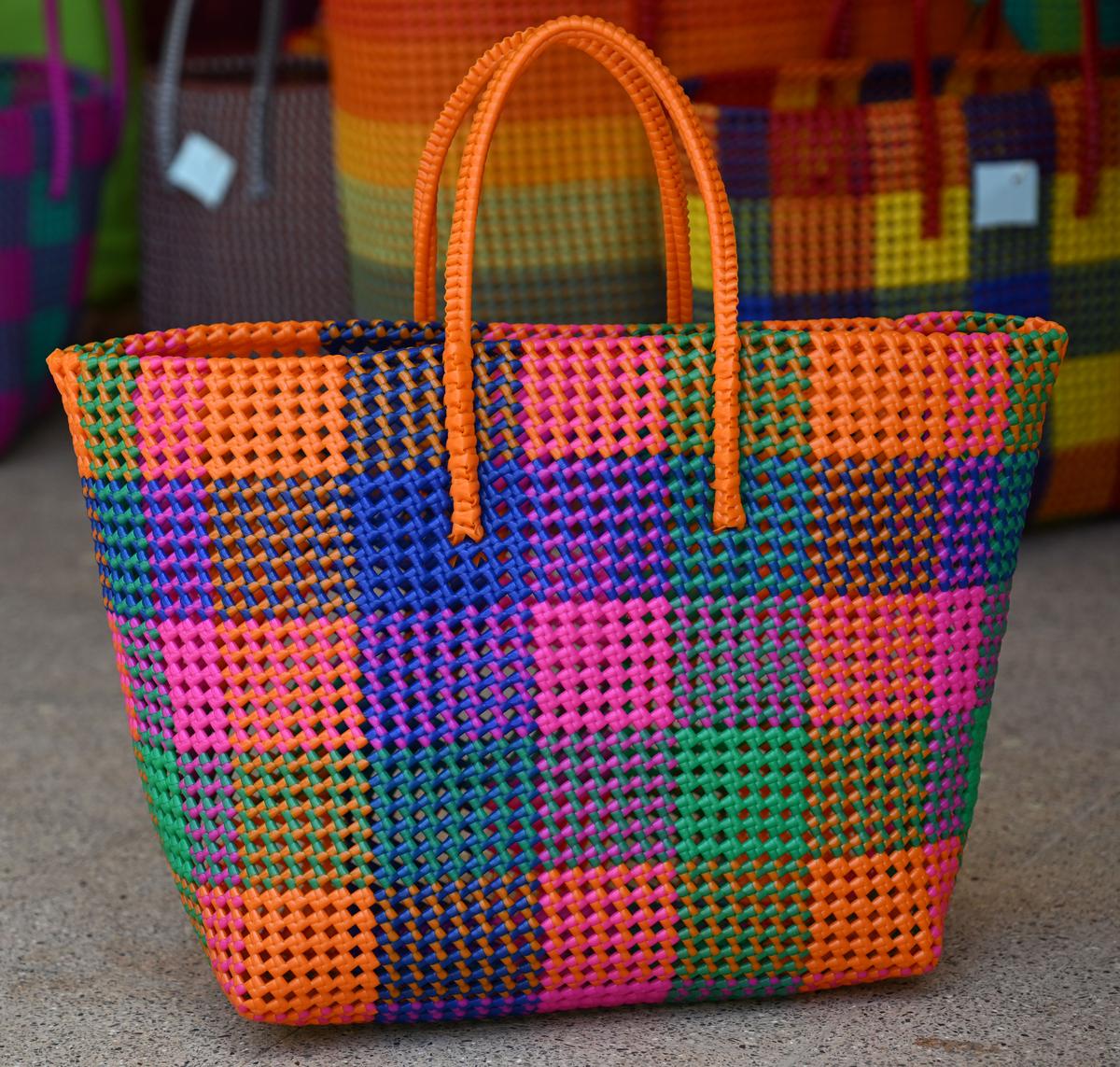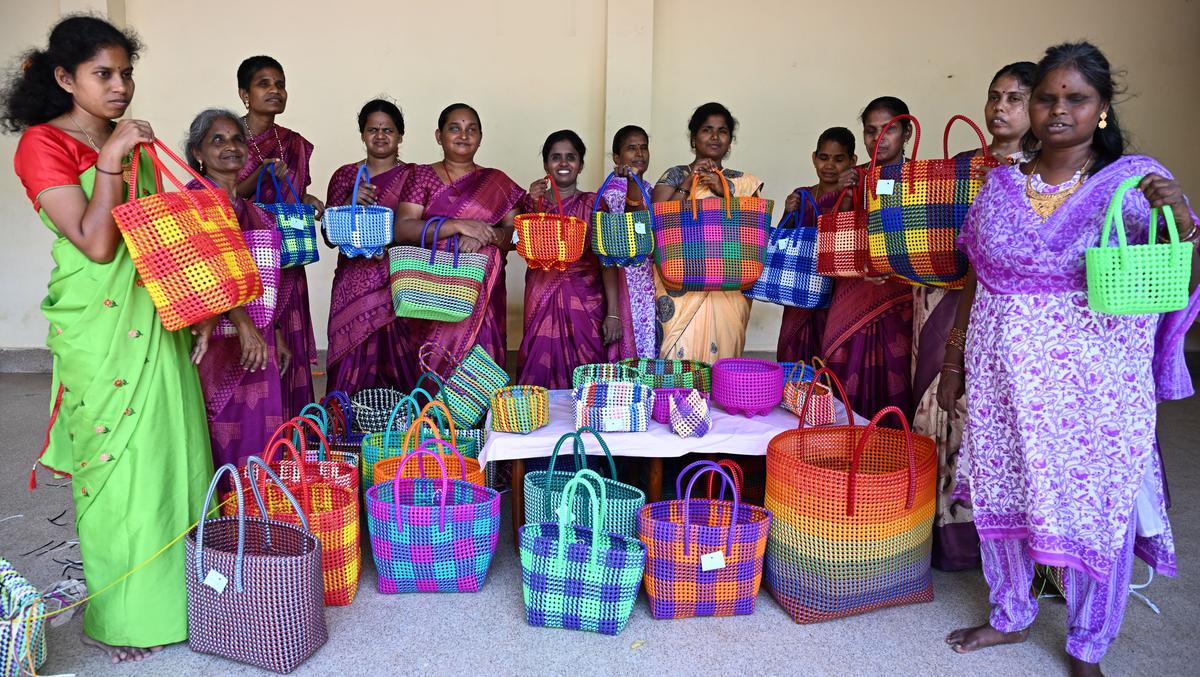
[ad_1]

Nylon wire baskets woven by visually challenged workers at Rehabilitation Centre for Blind Women in Tiruchi.
| Photo Credit: M. Moorthy
Muthamilselvi’s fingers fly as they knot strips of nylon wire into an archanai koodai’, a deep, round basket that is used to carry temple offerings. “I have woven small stands within the basket to make self-balancing. If we make it without a handle, it can be used to store onions or garlic. Most of these items can easily be adapted according to our requirement,” she says.
The 48-year-old visually challenged artisan is one 15 members of the basket weaving section at the Rehabilitation Centre for Blind Women (RCBW) in Tiruchi. And going by the increasing number of orders per day, the team seems to be on a winning streak.
The team has produced over 1,000 customised baskets for customers in Coimbatore, Delhi, Bengaluru this year and is expecting to sell more in the run-up to the festive seasons. They are marketed with the help of a social media account and landline number.
“A client from Haryana wants a bulk order of 24 baskets, each with its own unique colour combination. We are getting them ready for shipping,” says Deiyvanai, as her colleague Manimekalai cuts even lengths of wire from a pink bundle.
The worker uses her forearm as a ruler, and cuts the strips with the help of a metal snipper. Each artisan maintains their own marking system to ensure that the colours are used in the right order. “We keep checking each row’s progress with our fingers. It is easier to rectify mistakes in the manufacturing stage. The number of rows tells us when the basket is ready to be finished,” says Manimekalai.
In a week, the group gets through at least 25 kilos of vibrantly hued wire bundles. The knots are kept simple, to save on wire, and time.

A checked pattern basket woven by Rehabilitation Centre for Blind Women artisans.
| Photo Credit:
M. Moorthy
Trendy and eco-friendly
Established in 1975 by noted ophthalmologist and philanthropist Joseph Gnanadhickam (founder of Joseph Eye Hospital), RCBW is devoted to training visually challenged women in the age group of 18 to 35 years for professional work.
The ban on single-use plastic packaging has revived interest in the humble koodai, because of its durability. “These baskets can be reused, and also can carry a variety of goods. Repairing them is easy, and artisans can earn a steady income by selling them,” says Vimala Moses, daughter of Dr. Gnanadhickam and project director of the centre.
Besides the basket weaving, women here undergo training in tailoring, weaving and making office stationery. A bakery unit is handled in collaboration with sighted staff members.
Priced upwards of ₹125, the handmade baskets are also becoming a popular option for packing return gifts at social gatherings. “People are ordering small baskets to be given away after weddings and family functions, this year. With the festival season set to start, people are looking for unique gifting ideas,” says Vimala.
Proceeds of the basket sales are remitted to RCBW, with each artisan paid a small share per piece according to their work rate per month. “This is a free residential facility, so the girls’ earnings are saved in bank accounts for their personal use,” says Vimala.
Route to empowerment
Depending on their expertise, the women can weave small to medium-size baskets, including their handles, within three days. The work is limited to daytime shifts.
At times, two or more artisans team up to create heavy-duty bags that are in demand among street vendors. “This basket can hold two big cans of water, big tiffin carriers or even packed clothes, and can be transported easily on a two-wheeler,” says Deiyvanai holding up a humongous basket in shades of orange. Among its more unusual uses, she adds, is as a carrier for roosters used in cockfighting tournaments.
Basket weaving has promoted entrepreneurship among visually challenged women, says Muthamilselvi, who initially learned the craft at the Government Girls’ Higher Secondary School for the Blind in Puthur. “Whenever I go on leave to visit my brothers’ family in Woraiyur, I buy wire bundles from my savings and weave baskets in my spare time. Selling them to the nearby stores has helped me financially. I feel so proud when someone buys a koodai from me,” she smiles.

Visually challenged basket weavers seen with their products at Rehabilitation Centre for Blind Women in Tiruchi.
| Photo Credit:
M. Moorthy
Published – September 20, 2024 01:51 pm IST
[ad_2]
Source link